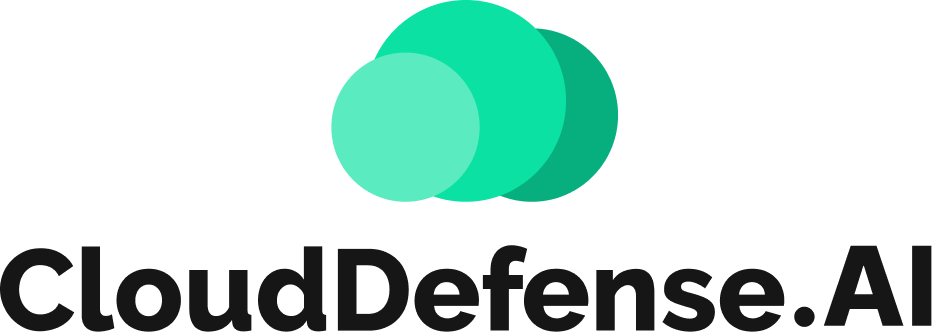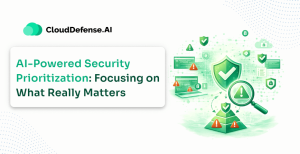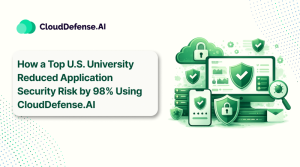What Is Secret Management?
Secret management is the practice of securely storing, handling, and accessing sensitive credentials such as API keys, passwords, encryption keys, and certificates.
It protects secrets from unauthorized access while allowing authorized systems to access them. Instead of hardcoding credentials or storing them insecurely, secret management centralizes and encrypts them, enforcing strict access controls for approved applications and users.
Secret rotation is vital, regularly updating credentials to reduce security risks. Logging and auditing provide visibility and prevent unauthorized access.
Poor secret management increases the risk of data breaches. Properly securing secrets helps organizations protect sensitive information, maintain compliance, and reduce the likelihood of exposure.
How Does Secrets Management Work?
Secret management involves securely storing, controlling access, and handling sensitive credentials across an organization’s infrastructure. Here’s an overview of how it works:
Centralized Secret Storage
Instead of storing credentials (like passwords, API keys, and encryption keys) in unsecured locations, such as configuration files or code repositories, secret management systems centralize storage. This central repository securely holds secrets in an encrypted format, ensuring that they are protected from unauthorized access.
Encryption of Secrets
Secrets are encrypted both at rest and in transit. Encryption ensures that even if an unauthorized party gains access to the storage system, they won’t be able to read or use the secrets without the decryption keys. This makes it nearly impossible for attackers to misuse stolen secrets.
Access Control
Secret management systems enforce fine-grained access controls to ensure that only authorized users, applications, or services can retrieve specific secrets. This is done through role-based access control (RBAC), policies, or identity and access management (IAM) systems.
Secret Rotation and Expiration
To minimize the risks associated with long-lived credentials, secret management systems automate secret rotation. This means credentials are updated at regular intervals or when certain conditions are met, ensuring they don’t remain static for long periods. Some systems also allow setting expiration dates for secrets, further reducing exposure risks.
Audit and Monitoring
Secret management systems maintain detailed logs of who accessed what secrets, when, and why. This auditing provides visibility into secret usage and allows for tracking suspicious activity or unauthorized access attempts. Monitoring tools can alert administrators to potential security breaches in real-time.
Secure Secret Transmission
When secrets need to be accessed, they are retrieved securely by applications or services through encrypted channels (e.g., HTTPS or secure API calls). This ensures that secrets are never exposed in plain text during transmission, whether between services or to end-users.
Policy Enforcement
Secret management tools enforce consistent security policies across the organization. These policies dictate how secrets should be created, stored, rotated, and accessed. By applying these standards uniformly, the organization reduces human error and ensures a strong security posture.
Why Are Secrets Management Important?
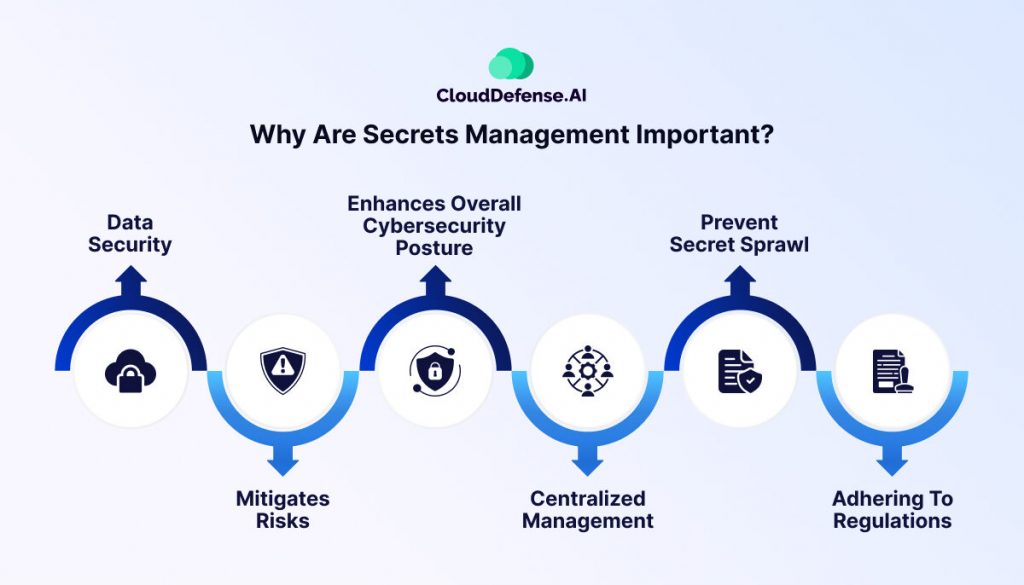
Secret management is a critical component of modern cybersecurity, addressing the challenges of securely storing, transmitting, and managing sensitive credentials. It not only protects secrets from unauthorized access but also enhances overall security by enforcing strict policies and reducing human intervention.
Strengthens Data Security
Secret management ensures the secure storage, transmission, and management of sensitive credentials such as passwords, encryption keys, API keys, and tokens. By minimizing human involvement and enforcing strict access controls, it significantly reduces the risk of unauthorized access and credential leaks.
Reduces Security Risks
By proactively managing secrets across IT environments, organizations can mitigate risks such as credential theft, data breaches, and unauthorized access. Secret management solutions enforce security best practices, including regular auditing and automated secret rotation, to prevent exploitation.
Enhances Cybersecurity Posture
Secret management plays a vital role in modern cybersecurity strategies by securing sensitive credentials and enforcing security policies across an organization’s infrastructure. This reduces vulnerabilities and strengthens the overall security framework.
Centralized Control and Visibility
A centralized secret management system allows organizations to monitor, control, and enforce security policies consistently. This eliminates the complexities of manual secret handling and ensures complete visibility into how credentials are accessed and used.
Prevents Secret Sprawl
Without proper management, secrets can become scattered across different systems, leading to secret sprawl, where organizations lose track of their credentials. Secret management centralizes secrets and applies uniform security policies, ensuring controlled access throughout their lifecycle.
Ensures Compliance with Regulations
For organizations subject to strict data protection laws like GDPR and HIPAA, secret management is essential. It ensures that sensitive credentials are securely stored, accessed, and managed according to regulatory requirements, helping organizations avoid legal and compliance risks.
Secret management is not just about securing credentials—it is about building a resilient security framework that minimizes risks, prevents unauthorized access, and ensures compliance. By adopting a strong secret management strategy, organizations can protect their critical assets and maintain a strong cybersecurity posture.
Secrets Management Challenges
While secret management serves as a core component of modern security strategy, the increasing complexity of the IT ecosystem with an expanding number of secrets is raising many challenges. The challenges that organizations are facing;
Manual Sharing
Not every developer will have massive expertise in managing secret management solutions, and this causes them to share all the required secrets across the development team.
This not only leaves a poor audit trail of sharing but also puts the secrets in an unsecured environment where hackers can exploit them.
Secret Sprawl
In modern times, developers use hundreds of secrets on a daily basis for accessing machines, tools, or functionalities. With the evolving multi-cloud environment, the number of secrets developers use is also increasing, and it causes developers to lose track of many digital credentials.
The lack of a centralized system for the increasing variety of IT ecosystems is making it difficult for organizations to enforce consistent policies. When these secrets are left unrevoked or in code, it allows hackers to exploit them and gain entry into the infrastructure.
Hardcoded Secrets
Whether developers are going for application to database access or any other type of communication, they will require privileged passwords and other secrets to get authentication.
However, on many occasions, IoT devices and applications are deployed while the default credentials are embedded into them.
This leaves the whole infrastructure vulnerable as malicious actors can utilize various techniques to extract the hardcoded credentials. Besides, DevOps tools often have secrets embedded in the files or scripts, allowing hackers to exploit them.
External Access To Database
In many scenarios, organizations often give APIs and database access to third-party vendors who utilize them for various kinds of services.
Since these third-party vendors are separate from the organization, it becomes daunting for organizations to enforce secret management of the digital credentials utilized by them. This makes the infrastructure vulnerable, as a leakage can jeopardize the whole system.
Cloud Computing Access
Various cloud administrators offer superuser privileges that allow users from different places to utilize resources and create VM instances.
However, every VM instance that is created during the spin-up of VMs leads to the creation of separate secrets used for accessing them. The increasing number of secrets and privileges that are created makes it difficult for secret management to secure them.
DevOps Environment
The DevOps environment also poses a severe challenge in secret management. Usually, DevOps teams use different configuration management, numerous orchestration, various tools, and automation that require distinctive secrets for working.
So managing these secrets by employing credential rotation, limiting access, and best practices puts a lot of burden on secret management.
Silos In Secrets Management
Every renowned cloud provider and DevOps platform offers their proprietary secret management tool to users to effectively manage a large number of digital credentials.
However, in many instances, there is a compatibility issue between the native secret management tools. This creates a silo in how secrets are managed in an organization, making it challenging for teams to manage secrets.
Secrets Management Best Practices
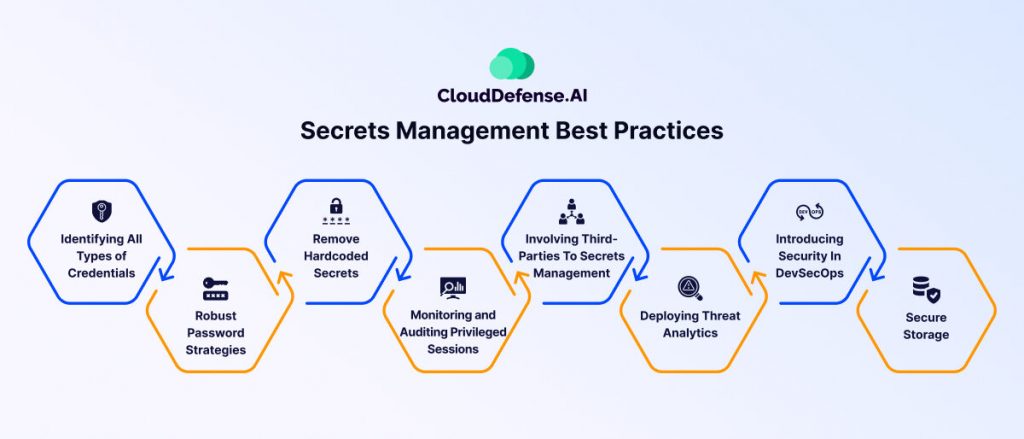
Managing secrets in an IT ecosystem is a possible task, but it has many shortcomings, like human error, inefficiency, and losing track of privileges.
Employing secret management best practices helps organizations manage all types of secrets while maintaining data security securely. Here are some best practices you can consider;
Identifying All Types of Credentials
While managing secrets in an IT ecosystem, it would be best to utilize any relevant automation to identify all the secrets, keys, passwords, API keys, SSH keys, and other credentials.
All the discovered secrets should be routed to a secret vault where, along with traditional secrets, various JSON files, XML files, tokes, and other secrets should be stored. The identification should be a continuous process as every day; many secrets are created.
Robust Password Strategies
An organization should enforce a strong password strategy that will make the employees create strong passwords with long lengths and complex character orientations.
Organizations should encourage employees to modify their passwords at regular intervals, utilize one-time password methodologies, and avoid using common password patterns.
Remove Hardcoded Secrets
Removing hardcoded and default digital credentials from tools and applications utilized by DevOps tools is highly useful for securing the data.
Eliminating default credentials will mitigate any backdoor that hackers might use to gain entry into your IT environment. All the hardcoded secrets should be routed to centralized management so the organization can get complete visibility.
Monitoring and Auditing Privileged Sessions
Secrets management tools should be integrated with privileged session management platforms as it will help IT keep track of activity sessions.
Monitoring and auditing privileged sessions will enable DevOps to identify suspicious activities and terminate them whenever needed.
Involving Third-Parties To Secrets Management
A great way to keep all digital credentials completely safe is by involving third parties in secret management strategies. You will have to ensure they follow the best secret management practices and follow the same policies to manage secrets.
Deploying Threat Analytics
It would be a wise move for you to consider a centralized secret management that will constantly evaluate the secret usage and identify any vulnerability and suspicious pattern.
When you get centralized secrets management, it will help in quick reporting on risks on accounts, applications, and containers.
Introducing Security In DevSecOps
Introducing a robust security strategy throughout the DevSecOps lifecycle from design to maintenance will enable better management of secrets.
Everyone should take responsibility for DevOps security, and it will ensure that everyone puts a similar effort into employing secret management best practices.
Secure Storage
Using secure storage along with data encryption and access control is another best practice you should employ to safeguard the secrets. Effective data encryption and secure access control should be employed to prevent unauthorized access.
FAQ
What is the secret management lifecycle?
The secret management life cycle indicates every stage involved in the management and safeguarding of secrets in an IT ecosystem.
The life cycle comprises different processes and practices that help protect digital credentials from exposure. Creation, storage, access control, distribution, rotation and update, monitoring, etc, are primary components of the lifecycle.
What are the features of secret management?
A secret management service incorporates a wide range of features that help them secure sensitive data, prevent unauthorized access, and maintain development workflow. Some standard features include access control, secure storage, auditing, logging, secret rotation, encryption, policy enforcement, etc.
What is the primary purpose of secret management?
The primary purpose of a secret management cloud is to safeguard all the digital credentials present in an IT ecosystem that is used daily for accessing different entities.
It helps in employing different policies and best practices to prevent malicious actors from accessing the secrets that can lead to severe data breaches.
Conclusion
Managing secrets is essential for data security today. It ensures sensitive credentials—like API keys, passwords, and tokens—are stored securely, preventing unauthorized access and lowering security risks.
As more organizations adopt cloud environments and DevOps, a centralized secret management approach is crucial. This boosts security and helps meet data regulations like GDPR and HIPAA.
Organizations that follow best practices and avoid hardcoded credentials reduce vulnerabilities and build market trust. A solid secret management strategy encrypts credentials, rotates them regularly, and restricts access to authorized users, significantly boosting security and risk management.
